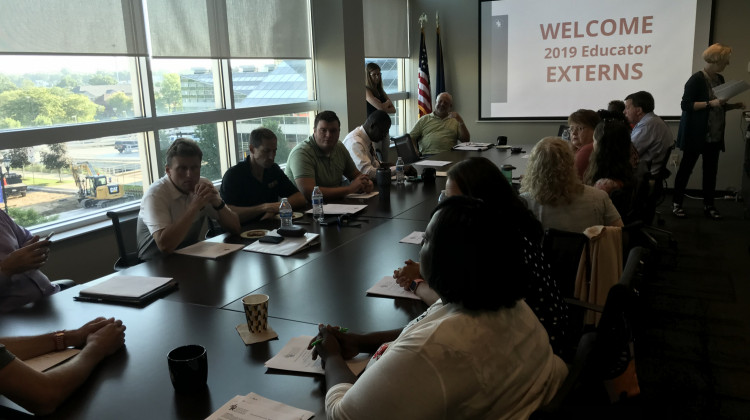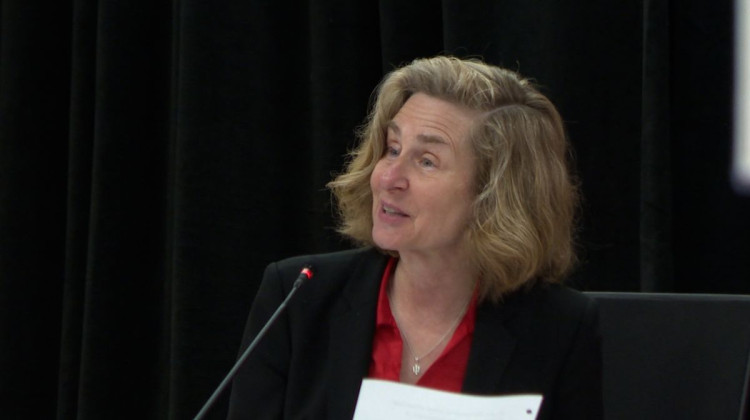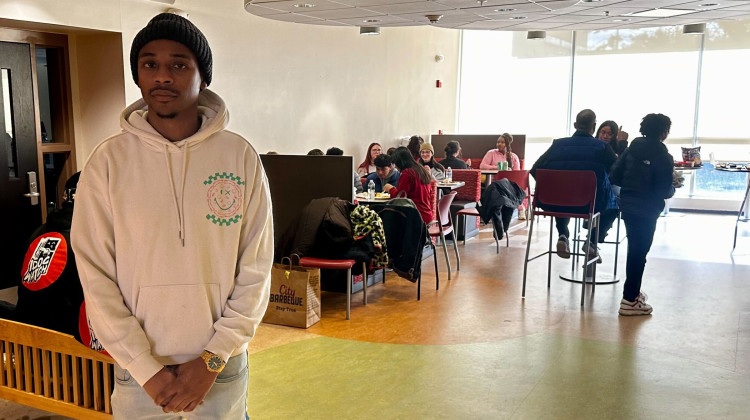
Teachers at an introduction for their externships organized by the South Bend Regional Chamber of Commerce.
Justin Hicks/IPB NewsJUSTIN HICKS & JEANIE LINDSAY
At the South Bend Regional Airport, Samantha Brady is taking local high school physics teacher Dan Walsh past a high security checkpoint to complete an airfield inspection.
Once inside, Brady then turns to Walsh and asks: “I’m sorry I didn’t ask prior, but what’s you guys’ purpose of being here?”
Walsh tells her he’s here to complete an externship as part of a new requirement for his teaching license. The idea is for him to connect what he teaches in his classroom to jobs at the airport.
“When a student asks me why do I need to understand this, then you can relate to them,” Walsh says.
Driving around the airport, Walsh has a great time. He and most teachers agree: having teachers connect classrooms to careers is a good idea. But many also have a big problem with how the state is doing it.
“When the law came out and told us we had to do these externships, I thought it was a little haphazard and just thrown into our lap,” he says.
Here’s what happened: Indiana lawmakers have been hyper-focused on skilling up and growing the state's workforce, and this year, a bill to support workforce-related school programs also changed the rules for teachers to renew their teaching licenses.
The new workforce-focused law says teachers have to focus a chunk of professional development training that’s counted toward what they need to renew a license, on something called “career awareness.”
The law says teachers can fulfill the new requirements through training focused on either: promoting career navigation for students; learning more about current and future economic needs and how to talk to students about them; or getting hands on experience working with a company – like the externship Walsh is doing.
But President of the Indiana State Teachers Association Keith Gambill says the way lawmakers changed licensure rules limited teachers’ input, and that widened the gap between educators and the statehouse.
“Any time you have something this large scale of a change to be done, in what seemed or appeared to be secretively, it creates a great deal of tension,” Gambill says.

Indiana has more than 72,000 licensed teachers. Ahead of the new law going into effect in July, nearly 51,000 of them had already started or finished renewing their licenses, meaning they can avoid the new career awareness rules for now.
There are other ways teachers can renew their licenses, but those take more time and money. When the law kicked in, a lot of schools weren’t sure how to help their teachers fulfill the new requirements with the resources and information they had.
Even setting the problematic rollout aside, Gambill doubts a required teacher training will actually do what the state intended: expose kids to future careers.
“This solution does not get to what is really needed and that is the connection between schools and the workforce, especially that industry that exists within their region,” he says.
Gambill says instead, businesses should work with schools directly.
Indiana Superintendent of Public Instruction Jennifer McCormick says this type of training should be optional for teachers, especially in elementary grades. She says, the state needs to offer funding for it too, but admits even getting enough basic funding remains an ongoing battle.
“So at a time where we're not even finding the funding to appropriately support salaries of teachers it's going to be very difficult to find monies to support externships,” she says.
Back in South Bend, Dan Walsh is now a few weeks into his school year. He says overall, his experience was good because the local chamber of commerce organized it well and even paid for his time. But Walsh says lawmakers need to be intentional when they roll out career awareness initiatives if they want support from teachers.
“I think you'd need to rethink this process. I think you need to go back and fund it in such a way that it's an investment in not just education but the community,” Walsh says.
A summer study committee of lawmakers is looking at ways to improve the efficiency and quality of required teacher trainings, and will send policy recommendations to the rest of the General Assembly ahead of the 2020 legislative session.
Contact Justin at jhicks@wvpe.org or follow him on Twitter at @Hicks_JustinM. Contact Jeanie at jlindsa@iu.edu or follow her on Twitter at @jeanjeanielindz.
 DONATE
DONATE







 Support WFYI. We can't do it without you.
Support WFYI. We can't do it without you.